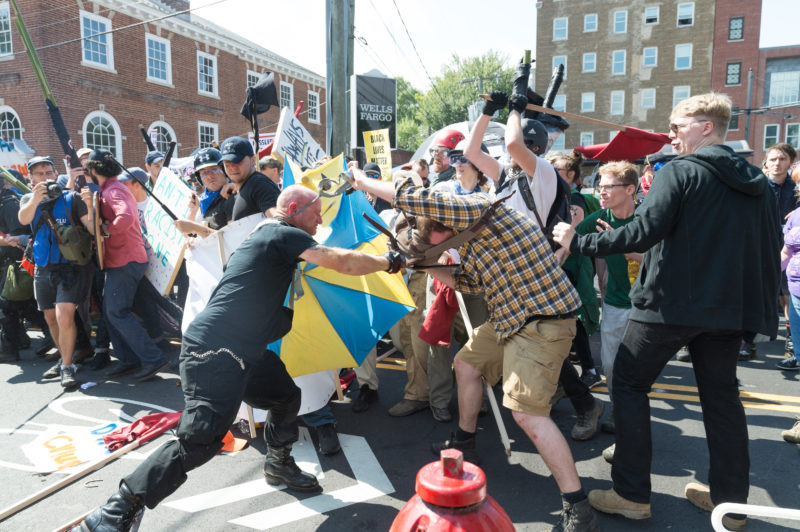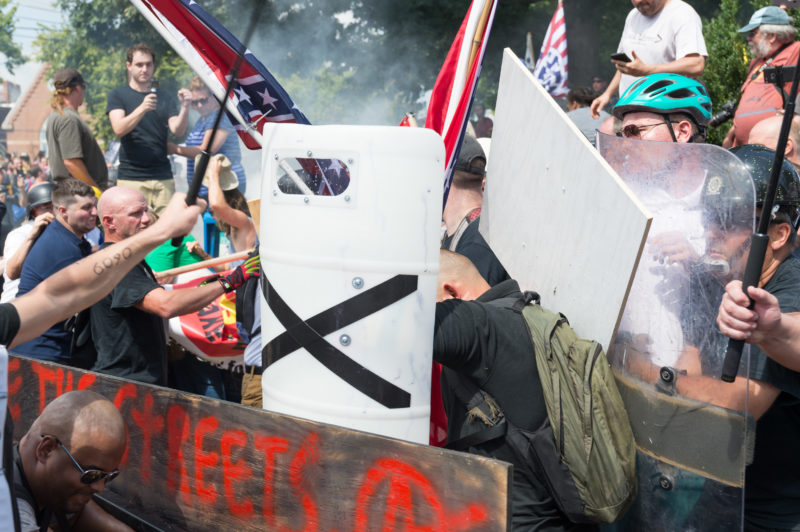Three Big Questions After Charlottesville
Henry Olson, American Renaissance, August 14, 2017
Future historians may view the Unite the Right event in Charlottesville as a turning point for the alt-right and the race-realist movement in America.
Before Charlottesville, many of us believed that the government — bound by the First Amendment — would respect our free speech, even if private corporations would fire and blacklist any employee who takes our side.
Then, on Saturday, we saw the Charlottesville city government ignore a federal court order permitting a pro-white rally, declare the gathering of white activists unlawful, and effectively endorse exactly the type of “heckler’s veto” that the First Amendment forbids. We saw the police forcibly disperse pro-white activists while allowing antifa to violently rampage, throwing bricks, urine, and feces at demonstrators with impunity. And then, after the pro-whites had been dispersed, when a car struck a crowd of antifa — for reasons still unclear — we saw the entire Establishment media rush to denounce the dissident movement as a “domestic terrorist organization.”

Credit Image: © Albin Lohr-Jones/Pacific Press via ZUMA Wire
Sure, we all know that “SJWs always lie.” But the blatancy of the media’s lies — denouncing terrorism from a group that was the primary victim of both government repression and private violence — is almost too shocking to believe, and only proves the point that journalists exist to police the left-wing Establishment narratives, more as ideological enforcers than any kind of “free press.”
These are dark times, which I fear will grow still darker. But struggle is also time for growth. The lull that follows each battle in our increasingly-less-cold culture war should provide opportunity for reflection. Given the new dynamics exposed in Charlottesville, I can think of several burning questions that our movement needs to consider.
1. Are we prepared for what comes after Trump?
A lot of our people were dismayed to hear President Trump’s weak platitudes against “white supremacy” and “violence,” and pleas for “unity” and color-blindness in response to a case that consisted almost entirely of his own supporters being attacked by the types of people who call for his own assassination and rioted at his inauguration.
While Trump’s response is disappointing, it is also probably the best we can reasonably hope for. As their reactions to Saturday’s events show, nearly every other 2016 presidential candidate would have declared the alt-right a terrorist organization by now, had they been given the power to do so. Hillary Clinton tweeted:
Every minute we allow this to persist through tacit encouragement or inaction is a disgrace, & corrosive to our values.
— Hillary Clinton (@HillaryClinton) August 12, 2017
Her former campaign manager Robby Mook wants the feds to look into terrorism charges:
Members of Congress can’t just condemn this with words, they need to force the Jusice Department to investigate and prosecute terrorism.
— Robby Mook (@RobbyMook) August 12, 2017
Most Republican candidates joined in too with even Ted Cruz — supposedly the second best option to Trump — demanding the Department of Justice begin an “immediate” domestic terrorism prosecution.
So far, it is unclear whether the car crash was really a premeditated murder or whether it came through panic or carelessness. But to the Establishment, these questions do not matter any more than the facts that the Obama Justice Department exonerated Officer Darren Wilson in Ferguson, Missouri, or that no evidence shows Russia “hacking” our election. In all these cases, journalists and politicians will just repeat their version of the story over and over as if it is the truth, until, with time, it becomes the accepted reality. And the newly-minted reality will be the only pretext that most politicians need to begin real political persecutions of dissident leaders and organizations.
Trump alone seems uninclined to do this (although even his Justice Department has opened a civil rights investigation into the car crash). But his presidency will not last forever. What would happen if a President Kamala Harris ordered the Department of Homeland Security in 2021 or 2025 to declare Richard Spencer a terrorist leader? If grand juries began subpoenaing American Renaissance and the National Policy Institute? In a world where even the President’s own associates are subjected to pre-dawn FBI raids for a ginned-up “Russia collusion” investigation, the risk of politically-motivated persecution should not be underestimated. As disappointing as Trump is, he at least won’t send political dissidents to prison. Are we prepared for what comes after?
2. Can we create a legal movement?
I was surprised that the ACLU decided to represent Jason Kessler and the Unite the Right protesters in Charlottesville. Though it had taken honorable and principled stands for free speech in the past, like defending Nazis’ right to march through predominantly Jewish Skokie, Illinois in 1977, the ACLU became noticeably quiet on civil liberties issues throughout the entire Obama administration, only discovering a new concern once Trump was inaugurated. Even this was mainly in defense of non-white immigrants’ abilities to move to the United States without restriction, combined with a healthy does of snark and virtue-signaling apparently tailored to the late night comedy generation. Its re-branding as the legal arm of the #Resistance has been immensely profitable. And the anti-Trump “resistance” that donates so generously is noticeably much less tolerant of principled stands for civil liberties than its parents and grand-parents were in the heyday of 1970s free speech liberalism.
Now, the supposed car attack and the mainstream media spin of “violence” surrounding the rally — all of the latter, of course, initiated by the Left — give the ACLU and other liberal civil liberties groups the excuse they need to withdraw from these kinds of legal battles in the future. After all, the freedom to speak is not a license to commit violence. And if the media successfully brands pro-white rallies as terrorist meetings, the ACLU can bow out while supposedly staying true to principle and maintaining its donor base.
This is not necessarily bad for us. An alliance with people who hate us but grudgingly side with us because of constitutional procedure is inherently unstable. Instead, the alt-right needs to create its own version of the Left’s National Lawyers’ Guild, a group whose only goal is pushing far-left causes, most often by giving legal coverage to antifa and Black Lives Matter protesters, including at Charlottesville itself. Many of the NLG’s tactics are disgusting. They will, for instance, defend leftist agitators even as they rampage and destroy innocent people’s property; recently, they called for the DC government to drop all charges against the Trump inauguration rioters. But we could learn from their ideological loyalty. We desperately need network of lawyers who will be ready to give emergency legal assistance to fellow travelers at rallies and conferences (as recent events show, even our conferences are not safe from leftist violence); file constitutional challenges against local governments who seek to undermine our First Amendment rights; and to litigate assault cases against leftists who attack us, and civil rights cases against police and prosecutors who deprive us of our civil rights through wrongful arrest and malicious prosecution. We need it not on the weak-kneed ACLU grounds that “the Constitution even protects the thought we hate,” but as an expression of ideological unity and a new front in winning the culture war.
The universe of racially aware lawyers is much smaller than the left-wing one, and many of these lawyers are afraid to come out for fear of backlash from their employers. But there need to be structures in place for those lawyers who will take the risks to defend us and to go on the offense against our enemies.
One attempt at such a network is the Foundation for the Marketplace of Ideas, which is preparing a lawsuit in defense of Nathan Damigo’s civil rights, which it believes were violated in Charlottesville (the crowdfund for the suit is here).
3. What good are paper barriers to the state?
Even if we do create our own legal movement, we will still have a long way to go. Charlottesville showed that, if the government wants to ignore the Constitution and shut us down anyway, it can do so; “paper barriers” like the First Amendment and judicial injunctions will not protect us.

Credit Image: © Albin Lohr-Jones/Pacific Press via ZUMA Wire
This is an old libertarian talking point. But it is still a valid one. The Constitution will protect us only if people are willing to enforce it. And Charlottesville shows that the entire political class is willing to ignore constitutional rights when the people deprived of them can be called “white racists.” There does not need to be any legal justification for this. As Carl Schmitt explained, sovereign power consists in the ability to make exceptions to general rules. And the sovereign power of the federal government is signaling that, even in the Trump era, the Constitution should not apply to us in the same way it does to others.
Each one of us will need to decide how to respond to anarcho-tyranny in his own way. Would he rather be publicly arrested, to shine light on the system’s hypocrisy? Or build support networks behind the scenes, which the state cannot shut down?
There are no easy answers. But we all must use the lessons of Charlottesville to find better ways to do our part. The Left will use Charlottesville to cry about oppression and try to profit from others’ sympathy. We must use it to improve ourselves so that we become worthy of winning our goals.















